“Coffee and Community, Coming Right Up!” How Cafe Con Libros Fights to Unite Crown Heights
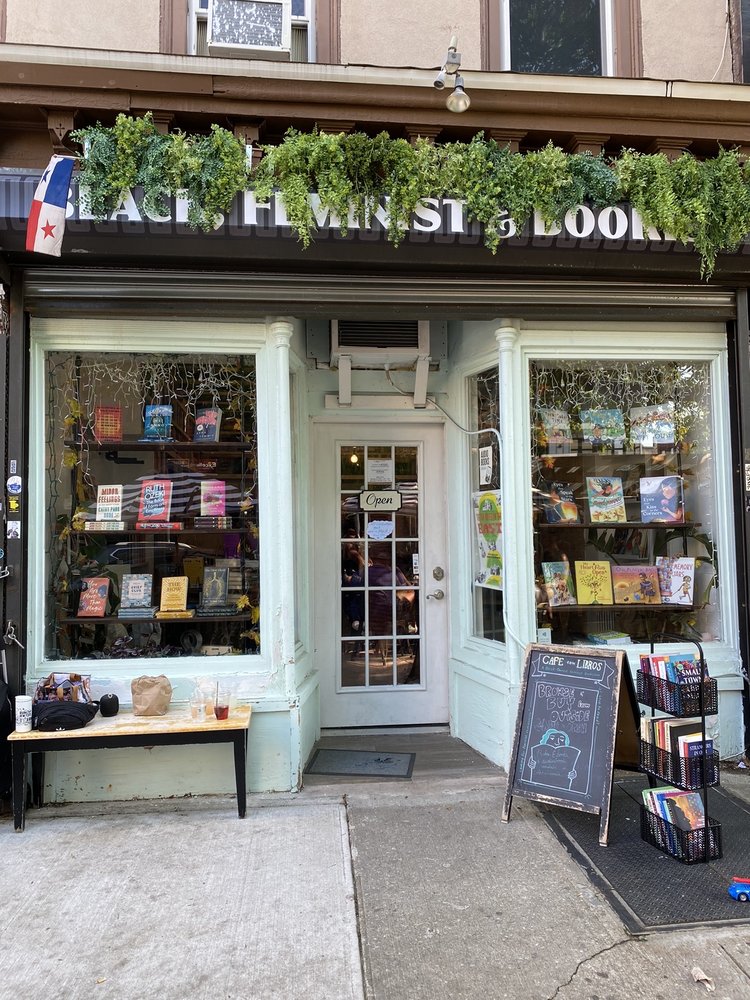
Tucked behind a cozy curtain of sage, forest, seafood, and bottle green shades of ivy hangs the stark black and white sign of Crown Heights’ combined coffee and book shop, Cafe Con Libros. “BLACK, FEMINIST, & BOOKISH” the sign reads on weeks that follow a good hedge trimming. On weeks that don’t, it doesn’t seem to matter. All the shop’s customers already know what the big block letters spell.
Cafe Con Libros is an intersectional feminist shop catered to, made for, and beloved by its Brooklyn neighborhood. There’s a homey and amicable sense of belonging emanating from its walls. As the Edinburgh academic Tim Cresswell describes in his book Place: A Short Introduction, there’s significance to this shop shaped by its locale and sense of place.
Sweet, nutty notes of espresso waft out the door as it swings open and shut. The windows display works written by women of all different bodies, backgrounds, and beliefs. Catchy coffeehouse tunes trickle out onto the street, harmonizing with the soft chatter of customers perusing the shelves. Locals gaze upon the rowdy road from cushy window seats, cupping warm mugs in their hands before returning to laptops, cracking open paperbacks, or scribbling on notepads.
Of course, this isn’t to say that geography doesn’t still play an insurmountable role in Cafe Con Libros’ sense of place. Most notably, the soft turquoise storefront stands on the frontlines of an uphill battle to unify an increasingly gentrified community.
Between 2000 and 2015, the area saw a 23% decrease in Black residents and a 205% increase in White residents (“Observer”). The median rent shot up from $870 to $1230, according to a study conducted by NYU’s Furman Center for Real Estate and Urban Policy.
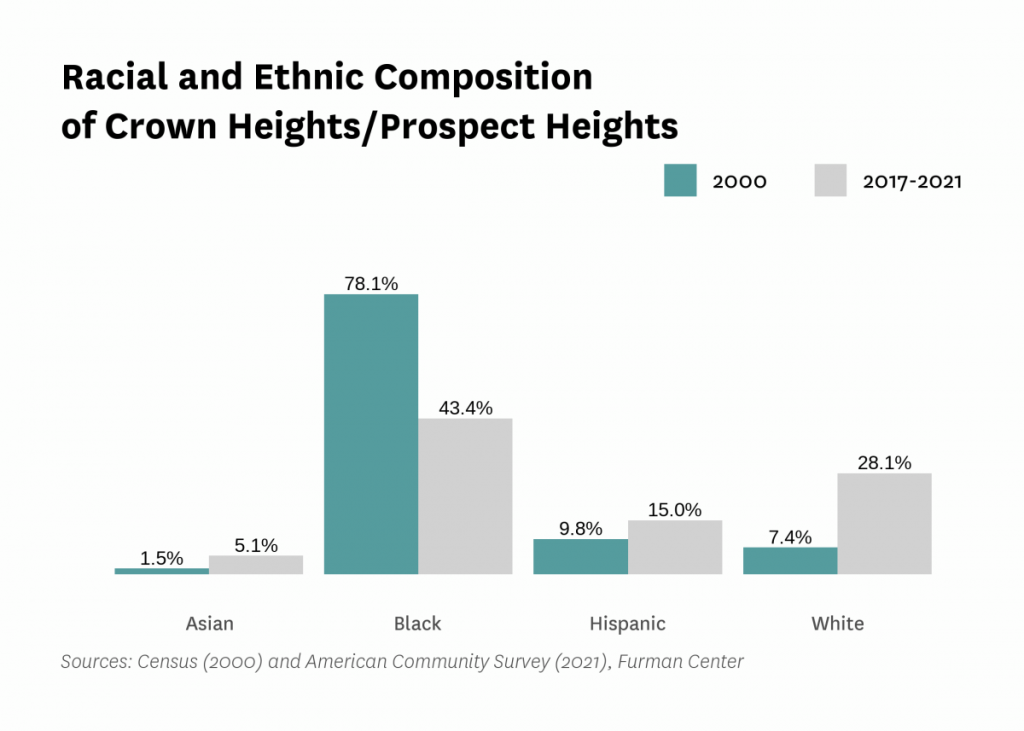
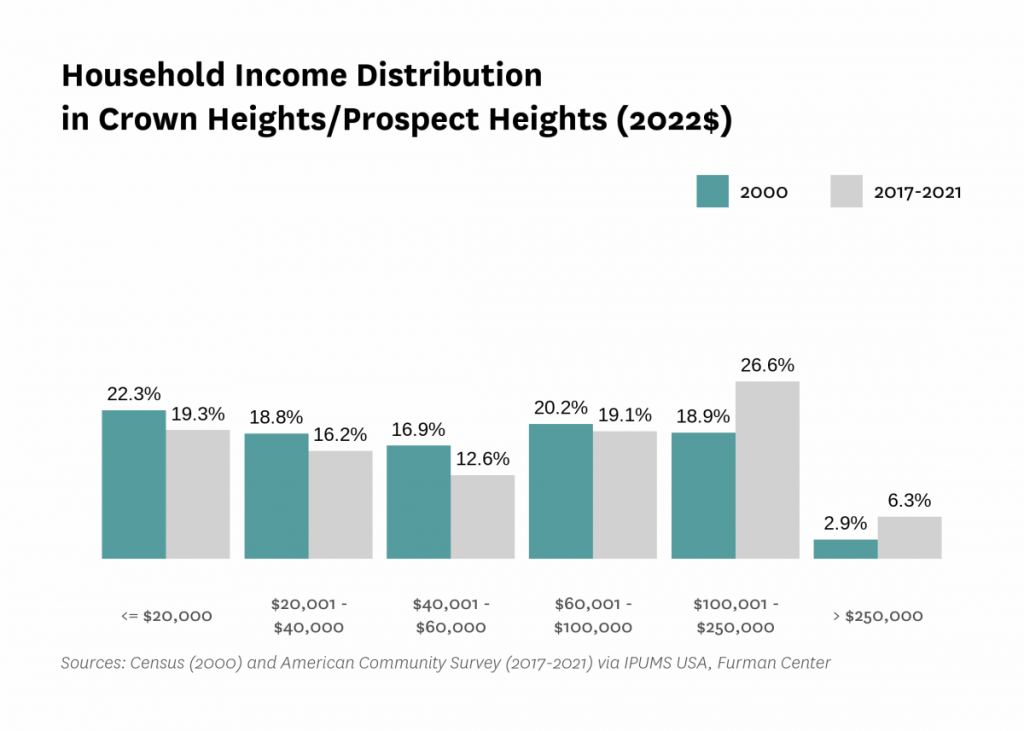
Cafe Con Libros’ Afro-Latina owner Kalima DeSuze grew up a six-minute walk away from the shop, a place she says was once crowded with old community convenience stores and African hair-braiding spots that have all since disappeared. Gone is the mostly Black and low-income neighborhood she knew as a girl. In its place, a tense population divided by race and class now bustles around one another, unsure of how to make peace with and live together (“Fernández”).
Kalima DeSuze knows she played a role in the gentrification of her town with Cafe Con Libros. She told a local publication that coffeeshops are a classic marker for redlining, that one popping up is an immediate signal to residents that the neighborhood is “done for” (“Fernández”). However, DeSuze took this as a challenge to signal the opposite to her community with a bold selection of books.
According to their website, the shop aims to “offer feminist texts for all personalities, political affiliations, temperaments, and tastes.” Their selection means to “represent as many identities as possible.” They even proudly offer selections for what they affectionately call their “baby, budding feminists.” Picture books and children’s toys take up the entire right-hand side of the window display, for all the new upscale families living nearby.
The left-hand window boasts Sally Rooney’s Beautiful World, Where Are You? and Lovely War by Julie Berry, but also features The Crunk Feminist Collection and The Misadventures of Awkward Black Girl by Issa Rae, attempting to fight the misconception DeSuze finds thrown around in her community far too often when presented with a feminist text: “Oh, that’s for white folk, that’s not for us” (“Fernández”).
“I aim to bring the folks together who would normally not feel comfortable with one another. This is what I want to see […] I want to see multiple identities being comfortable sitting and hanging out with one another and connecting across differences.”
– Kalima DeSuze, Owner of Cafe Con Libros (“Fernández”)
Bookstores today sell experiences as much as they do books and coffee, and DeSuze is using this to her advantage for community bulding. She cultivates a warm yet quaint space where people of various backgrounds can bump elbows while working, socializing, and reading. She personally welcomes in and welcomes back those who otherwise feel like they wouldn’t belong in a place like Cafe Con Libros.
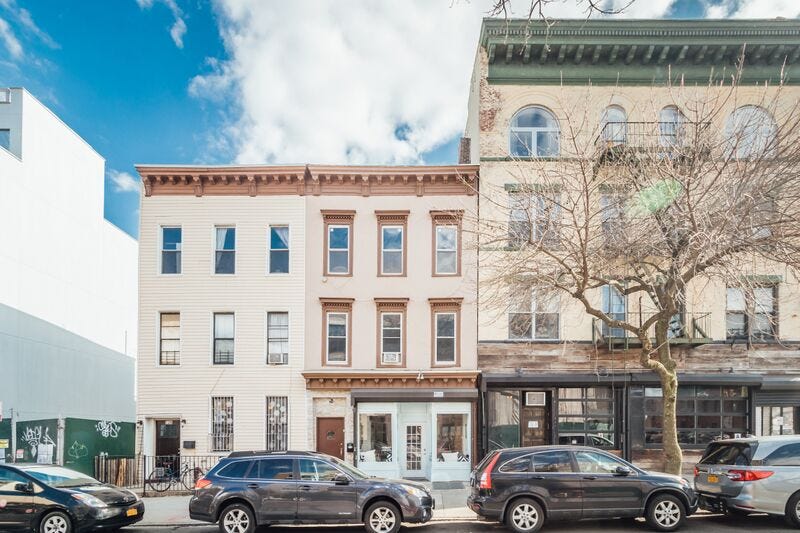
Early critics of the modern chain bookstore were critical of superstores being “better at promoting coffee drinking than an interest in ideas and the intellect,” as Laura J. Miller points out in Reluctant Capitalists: Bookselling and the Culture of Competition. However, socially conscious and intersectionality-minded shops like Cafe Con Libros show the obvious faults in this thinking with their feminist book clubs and late night readings.
Kalima DeSuze created a shop with a sense of place, a store that embodied the colloquialism of the old neighborhood she grew up in. No matter if someone’s family has been in the neighborhood for generations or they just moved in last year, DeSuze makes it so that everyone has at least something in common when they enter the front door: they know the sign behind the overgrown ivy reads “BLACK, FEMINIST, & BOOKISH.”
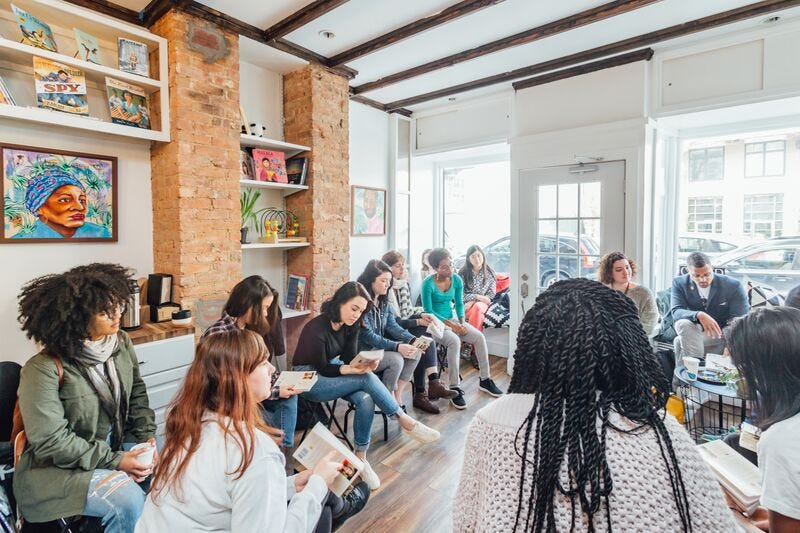
Works Cited
“Cafe Con Libros.” Rolling Out, rollingout.com/places/cafe-con-libros/. Accessed 18 Sept. 2023.
Fernández, Stacey. “This Afro-Latina’s Feminist Bookstore Is Building Community in Gentrifying Crown Heights.” Remezcla, 10 Mar. 2018, remezcla.com/features/culture/this-afro-latinas-feminist-bookstore-is-building-community-in-gentrifying-crown-heights/.
Hinterland K, Naidoo M, King L, Lewin V, Myerson G, Noumbissi B, Woodward M, Gould LH, Gwynn RC, Barbot O, Bassett MT. Community Health Profiles 2018, Brooklyn Community District 8: Crown Heights and Prospect Heights; 2018; 32(59):1-20.
“Intersectional Feminist Bookstore: Cafe Con Libros: New York.” Cafe Con Libros, www.cafeconlibrosbk.com/. Accessed 18 Sept. 2023.
“Portraits by Chris Setter.” NYC Photographer Chris Setter, www.chrissetter.com/. Accessed 18 Sept. 2023.
“State of New York City’s Housing and Neighborhoods in 2018.” NYU Furman Center, 2018.

0 Comments